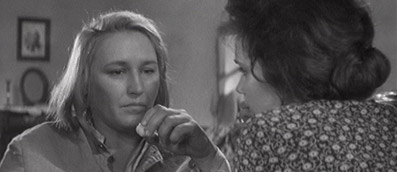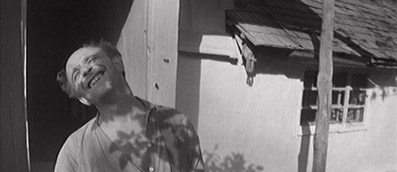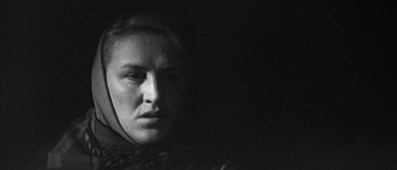|
In
the early 1960s, young Muscovite Aleksandr Askoldov learned
a valuable lesson about life, that art is more fulfilling
than duty or comfort. Working for the Ministry of Culture,
he was sent to investigate a revolutionary production of
Sidor Shtok's play Anchor Square, which was being
staged in Leningrad by renowned actor-director Rolan Bykov.
The ministry was looking to have Bykov replaced, but Askoldov
was captivated by the production and instead of filing
the expected negative report, he sided with the director.
Not long after,
he quit his job and its comfortable salary and successfully
applied to become a film director.
Askoldov
had no artistic axe to grind, despite losing both parents
in the Stalinist purge. But he was, in his own words, a little
naïve, some might say idealistic. Recalling the kindness
shown to him by a Jewish family when his parents were taken
from him, he chose for his first feature an adaptation of
Vasily Grossman's short story, In the Town of Berdichev,
whose plot in some key aspects mirrored Askoldov's own childhood
experiences. All seemed to be going well, but on viewing
the finished film the authorities were aghast. The work
was instantly confiscated and subjected to an indefinite
ban and Askoldov was expelled from the Communist Party,
prosecuted for squandering state funds, and forbidden to
engage in further film work.

Twenty
years later, in the time of perestroika and the release
of previously suppressed films, the ban on The Commissar [Komissar] was re-examined and surprisingly
re-enforced. On 9 July 1987 at the 15th Moscow International
Film festival, a question from a Brazilian journalist about
the release of previously shelved Russian films prompted
Askoldov to leap to the podium and demand that the 20-year-ban
on his own film be finally lifted. With Soviet bureaucracy
now under the enquiring gaze of the international media,
those in authority finally capitulated and a battered print was screened
to an audience of filmmakers from around the world. Their
reaction was very positive. The film was subsequently screened
at the 1988 Berlin International Film Festival, where it
won four prizes, including the Silver Bear Special Jury
Prize. It went on to win nine other international awards
and even received a gala screening in the US Congress. To
this date, the film has never been shown in any Russian film
festival, nor received any awards on its home turf.
So
what was it, exactly, that so enraged the Soviet authorities
about The Commissar? Too much sex and nudity?
Morally suspect undercurrents? No, The Commissar
did something much more dangerous: it suggested that maybe
the revolution had not been so great for everyone caught
up in it, that anti-Semitism was probably not a good thing,
and that it might by a nice idea if instead
of fighting we all tried to understand each other and learn
to live in peace.
The
Commissar of the title is Klavdia Vavilova, a female Red
Army officer stationed in the Ukraine during the Russian
revolution and who is heavily pregnant by an unspecified
father. She's hiding it well under her winter clothing,
but with the time of birth approaching she confides in her
commanding officer, who arranges for her to be billeted
with a poor local Jewish family until the baby is born.
With their small, ramshackle home already cramped by six
children and a grandmother, the father Yefim protests loudly,
while his wife Maria has a kinder attitude to their sullen
guest, quickly realising her condition and empathising with
what she is soon to experience. Over time, even Yefim warms
to Klavdia, whose stony exterior begins to soften with the
birth of her child. But with the arrival of anti-Communist
forces in the area, Klavdia has a difficult decision to
make.
There
is a disarming economy to the manner in which Askoldov sets up the story,
establishing Klavdia's authority, character and condition
in three short scenes – the arrival of the garrison in a
Ukrainian town, the capture and surrealistic execution of
a deserter, and the telling conversation with her Commander – and twenty minutes in she is billeted with the Mahazannik
family, where she will remain for the pretty much the rest
of the film. This is a story of revolution and battle only
in how it is perceived by those on the fringes of its idealistic
crossfire.

The
two parties initially appear to be polar opposites. The
well-fed Klavdia is sternly committed to her cause and regards
her accidental pregnancy as a tiresome inconvenience (her
request for a termination coming too late and falling on
deaf medical ears), while the Mahazanniks openly celebrate
life and adore the children they can barely afford to feed.
Their positive outlook is perfectly captured on the morning
following Klavdia's arrival at the Mahazannik home, as the
still irritable Yefim emerges from his house and seems to
take a delight from the air and the light around him, lost
in the music of a traditional song and moving in dance steps,
until the reality of the day ahead brings him back down
to earth.
Both
Klavdia and Yefim have their preconceptions to overcome,
and it is the non-judgemental Maria who acts as a catalyst
for the gradual bonding that transpires. It happens in almost
invisible steps – later in the story, for example, one of the Mahazannik
children asks a question of 'Aunt Klavdia', a
seemingly natural step in the process of mutual acceptance. The performances of the
three leads (Nonna Mordyukova, Rolan Bykov – the actor-director
whose play Askoldov had earlier defended – and Raisa Nedashkovskaya,
as Klavdia, Yefilm and Maria respectively) are crucial
to making this work as well as it does, but there is a persuasive
intimacy to Askoldov's use of editing and the scope frame,
the handheld drifts and smooth dolly shots of Valeri Ginzburg's
frequently mobile camera giving some scenes an almost neo-realist
feel. Later the camera is used to strikingly expressionistic
effect, as when it glides gracefully and repeatedly between
the two mothers in seperate rooms, simultaneously suggesting
both the bond and the still-existing gulf between the Klavdia
and her adoptive family.
This
combination of assured technical handling, well-judged performances
and finely observed character detail proves increasingly
involving. But it's in the final half-hour, by when your
engagement with the characters and their situation is complete,
that the film delivers its real emotional clout and its
most cinematically extraordinary scene. As the family shelter
in the cellar and the shells of battle begin to fall, Yefim
breaks into song and dance and encourages his scared and
crying children to participate, the camera tilting up into
the dark and back down onto each joyously distracted family
member. Only Klavdia fails to participate – watching the
family dance in the face of fear, she is suddenly hit by
a startlingly realised vision of their possible future fate
as they are herded into a Nazi death camp, while all she
can do is follow and watch with dazed disbelief. It's a
stunning sequence and one whose power comes almost entirely
from its cinematic presentation, as perfectly realised a
scene as you'll find anywhere in modern Soviet cinema. From
here on in, the grip never loosens.

There
are clear and deliberate religious elements to the story
and the detail, from the meagre shelter offered for the
mother-to-be to the touching scene in which Yefim declares
his love for Maria by washing her feet (a favourite sequence
of just about everyone involved in the production), but
no God is needed to validate the film's humanist message.
The Commissar is remarkable, multi-layered
cinema, whose confidence of handling and vision is all the
more astonishing for it being a first feature. That it was
to be Asdolkov's only film is a shameful comment on a system
that encouraged and enabled considerable creativity that
it also had the power to ideologically throttle. Times have
changed, of course, but it would be foolish to pigeonhole
such stories as examples of old school Soviet oppression,
as the many victims of the McCarthy blacklist will doubtless
testify. Creative freedom is constantly being challenged,
and it is perhaps ironic that the very religion that so
influenced Asdolkov has just this week flexed its muscle
to ensure the removal of an artwork by Cosmic Cavallaro
from the Roger Smith Hotel gallery in New York on the basis
that it offends their own particular restrictive ideology.
OK,
there are a fair few imperfections here and I'll deal with
them first. Contrast is a little variable and black levels
are sometimes weak, there is occasional digital shimmering
on some areas of fine detail and the odd bit of flickering,
and sharpness is good rather than great. But according to the
interview with Asdolkov on this very DVD, half of the original
negative was destroyed and the few surviving prints were
in anything but sparkling condition. With that in mind the
transfer here is probably as good as you could hope for,
and for the most part the print actually looks better than
the film's turbulent history would suggest it should. The
framing is 2.35:1 and the print is anamorphically enhanced.
Almost all traces of dust and dirt have been removed.
The
original Russian mono is joined by a new 5.1 remix that
is something of a mixed blessing. It shines in the reproduction
of location atmospherics, the thundering of horses hooves
(a memorably thrilling tracking shot) and the approaching
explosions of battle, but there are plenty of times when
the mono track feels more, well, right for the
film. There are some fearsomely rumbles on the 5.1 track
that, although very effective, just weren't there at all
on the original mono. There's also an English language track – it's not a dub in the usual sense, but the original soundtrack
with a Russian-accented voice translating everything, including
the signs.
This
2-disc set is one of Artificial Eye's Russian Cinema Council
licences – the extra features have presumably been included
in the package, the majority of which appear on disc 2.
DISC
1
V.
Grossman
A textual biography of Vasily Grossman, writer of the short
story on which the film is based.
Filmographies
Textual biographies for director Aleksandr Askoldov, cameraman
Valeri Ginzburg, production designer Sergei Serebrennikov,
composer Alfred Shnitke, actors Rolan Bykov, Otar Koberidze
and Vasili Shukshin, and actresses Nonna Mordyukova and
Raisa Nedashkovskaya.
Photo
Gallery (1:56)
A rolling gallery of photos, set to music from the film.
The pictures fill the widescreen frame, are anamorphically
enhanced, and are of excellent quality.
Stills
From the Film (1:22)
As above.
DISC
2
Some
of the titles here have menus, and a couple of those are
sub-divided further.
A.
Askoldov
Interview
(39:22)
A consistently fascinating interview with the film's director,
Aleksandr Askoldov, who talks about his childhood and
"the cruelty of Stalinism," his early career,
the genesis of the film, the changes made to Grossman's
original story and the sequence of events that followed
the films release, amongst other things. There's some
great stuff here – the post-completion fight for the film
is particularly compelling.
From the Archives
This contains three archive interviews, all of VHS quality.
Actress Nonna Mordyukova (4:40)
talks of her admiration for Askoldov and berates him for
never making another film. Raisa Nedashkovskaya (3:32) sings the family song from the film and adds her
support for the director, suggesting that the problem
the authorities had was that he "called things by
their real name." This sound on this interview is
out of sync with the picture by a good second. Rolan
Bykov (17:03) talks about his initial reluctance
to play the role (he was fed up with the idea that all film Jews
were always automatically good people), and his development
of the character and improvisation of some elements. Like
the others, he feels that what Askoldov went through was
dreadful. Intriguingly he talks of a new Askoldov film
project that has yet to come to fruition, and cites Wim
Wenders as one of those raising investment money. This
is also out of sync, but by less than the first interview.
It's immediately followed by a separate archive interview
with the Bykov (11:22) in which
he talks about his favourite scenes, playing the role
of Yefim and the post-completion impact.
Filmography
The same textual biography of Askoldov as on disc 1.
Letters
A textual translation of two letters, the first condemning
Askoldov and his behaviour, claiming that in the film
"the revolution was presented as a blind and unrestrained
force, depriving man of hope, ideals and happiness."
It also accuses the director of "unprofessionalism."
The second, addressed to the General Secretary of the
Communist Party, defends him and his character, and is
signed by by Alexander Shtein, Leonid Zorin and Alexander
Borshchagovsky.
Documents
Reproductions of two of the actual documents that sealed
Askoldov's artistic fate following the condemnation of
The Commissar.
Interview
with R. Nedashkovskaya (15:01)
From the start the actress expresses her fondness for the
film and the role of Maria, and talks about the film, her
character and the film's global message. She understandably
describes Askoldov's expulsion from the film industry as
a terrible loss. An intriguing aside tells us how they got
one of the children to cry so effectively.
Press
(2:40)
Press clips from the 1988 release, reproduced on screen
read out in Russian, with optional English subtitles.
Awards
A textual list of awards the film has won.
Photo
Album 'Recognition' (4:49)
Photos, international film posters and film festival posters
from the eventual release.
The
Commissar arrives on UK DVD on the back of some
impressive acclaim, but it really is justified. A very reasonable
job has been done of the restoration, and some of the extra
features here, notably the excellent interview with Asoldov
himself, are really worth that second disc. Devotees of
world cinema, of great, humanist cinema, owe it to themselves
to see this film. Warmly recommended.
|